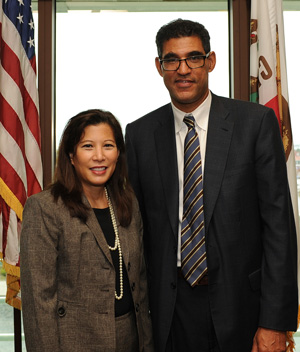Bench and bar leaders unite on
need for court funding
By Diane Curtis
Staff Writer
New State Bar President Jon Streeter and Chief Justice Tani
Cantil-Sakauye spoke with one voice at the bar’s Annual Meeting last
month in Long Beach, sending the message that court funding must be a top
priority for both bench and bar.
 |
Chief Justice Tani Cantil-Sakauye and
State Bar President Jon Streeter |
“I cannot overstate the gravity of this issue,”
Streeter said in his inaugural speech after being sworn in by Cantil-Sakauye as
the 87th president of the bar. “The quality of our justice system
is being eroded, and once a phenomenon like this starts, it is hard to say
where it will end.”
Sometimes, he said, “it takes a crisis to galvanize the
forces of change, and I believe this is one of those times.” He noted
that the scope and magnitude of the cuts are greater than ever experienced and
will be felt “where the public will feel it the most” ― in
the trial courts.
“The lives and physical safety of citizens are at stake all
day every day in some of the court departments that are most vulnerable to
closure,” he said. “Talk to any judge who has sat in a family law
department. If we turn the courts into a dull and unresponsive instrument when
dealing with the most difficult of human problems, we make our civilization
meaner and more brutal.”
A partner at Keker & Van Nest in San Francisco who specializes
in complex litigation, Streeter, 54, succeeds Bill Hebert as president for a
one-year term.
In her first annual address to the State Bar, the chief justice called for a
team effort to increase the judicial branch budget from its current 2.4 percent
of the state’s general fund. “We have done our part, admirably and
heroically with shrinking resources, trying to provide the same level
service,” Cantil-Sakauye told an audience of judges and lawyers, as well
as family and friends attending Streeter’s inauguration and the
swearing-in of new members of the boards of the bar and the California Judges
Association. “But the remedy doesn’t exist to fix the branch with
2.4 percent of the general fund.”
Her top priority, she said, is to keep the courts open, followed
by strengthening the branch from within, building safe and accessible
courthouses that include a user-friendly case management system and informing
the public about the important work the bench and bar do to protect the rights
of the public. All such efforts will require lawyers and judges to work together.
With his wife, mother, two daughters, two brothers and other
family members in the audience, Streeter promised that the bar will be a leader
in finding a solution to inadequate funding of the courts. “The bar has
your back,” he told the chief justice. “We cannot stand idly by and
see the vision of uniform justice for all Californians destroyed,” he
said.
Ultimately, added Streeter, a graduate of Stanford University and UC Berkeley
School of Law, he supports a constitutional ballot initiative “designed
to fundamentally change how the justice system is funded” although
shorter term solutions also are needed.
He warned that with severe underfunding of the courts comes
the possibility of returning to an era in which the quality of justice is
based on a person’s ability to pay, noting that the wealthy can always
buy private justice, such as that provided by private judges. Streeter
also warned that the bar and judicial branch must speak with one voice in
seeking adequate funding for the courts. “Our message will not be
effective if judges for whom we carry this message are perceived as
divided,” he said.
A statewide steering committee of influential lawyers from
throughout the state has been formed to draw up a set of proposals to address
the need for stable, sufficient funding for the courts, both for the short and
long term.